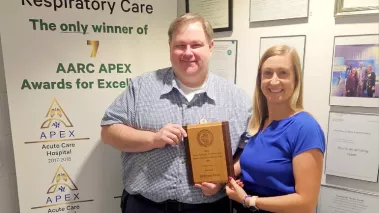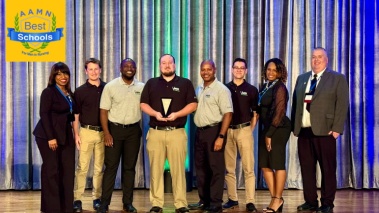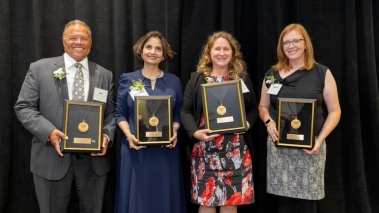After receiving and reviewing the best ideas from Chicago-area researchers and educators, the RUSH Center for Emerging Infectious Diseases selected eight innovative projects to help prepare for future public health threats.
From analyzing air and wastewater samples to identifying and tracking infectious diseases in humans and animals, the projects will share $340,000 in pilot awards to enhance infectious disease research and community preparedness in Chicago. RUSH will collaborate with scientists, educators, students, researchers and clinicians to develop the innovations related to monkeypox, potential rat-borne diseases, sexually transmitted diseases, antibiotic resistance, COVID-19 and biotech education.
“We need to be ready to address the next pandemic, and at the same time address some of the long-standing infectious diseases facing our community,” said Stefan Green, PhD, interim director of the CEID and director of the Genomics and Microbiome Core Facility at RUSH University. “The CEID is a framework for identifying emerging infectious diseases and collaboratively building a scientific and community response, as well as furthering research and education on known infectious diseases.”
The Center for Emerging Infectious Diseases at RUSH University was created to enable a sustainable center for collaborative research, training and community involvement that will help in preparation for current and future health threats. The center’s pilot grant program was initiated to seek and help support research and educational projects that will further its goals.
“We are proud to be able to support these creative and innovative efforts to identify and mitigate current and future health threats,” said Andrew Bean, PhD, dean of the Graduate College and interim vice provost for research at RUSH University. “The center builds on the long-standing leadership RUSH has exhibited in approaches to infectious diseases, health equity, research and education, while bringing together scientists and educators from across Chicago.”
This is the first year for the pilot grant program. Each project will be completed by June 2023, and the findings will be presented at community seminars across the Chicago area. The projects are:
Monitoring air in the Emergency Department
Using newly developed technology, this project will study the effectiveness of sampling the air in the RUSH University Medical Center Emergency Department to detect pathogens and provide an early warning of infectious diseases present in the air. The study, Pathogen Surveillance by Ambient Air Monitoring in the Emergency Department, will target pathogens that are highly likely to be present in the community, specifically respiratory viruses. In addition, researchers, led by virologist Hannah Barbian, PhD, will use genomic sequencing to discover other emerging microbes in the ambient air samples.
Patient registry for monkeypox
Researchers will create a registry of monkeypox cases to study trends in symptoms, lab results and outcomes. The data will help the team develop and test a screening tool for patients suspected of having the virus as well as further understanding of how the current outbreak of monkeypox compares to previous monkeypox cases. Michael Gottlieb, MD, emergency medicine, is leading the RUSH Active Monkeypox Patients Registry project.
Studying Chicago’s rat population
RUSH is partnering with the Lincoln Park Zoo to help identify pathogens that are transferred from rats to humans and to educate Chicagoans about the risk of rats to their health. Since 2018, Lincoln Park Zoo scientists have led the Chicago Rat Project, which has studied the diseases the rodents carry and how and when residents are exposed to them. Building on the zoo’s educational work with Chicago Public Schools, the project will develop an interactive lesson on the ecology of rats for high school biology students. The project also will educate the public and city leaders on the risks posed by the rat population. The Surveillance and Education Programs for Emerging Zoonotic Pathogens in Chicago Rats
Project is led by Supriya D. Mehta, MHS, PhD, professor, infectious diseases; Mehta is collaborating with a Lincoln Park Zoo wildlife disease ecologist.
Analyzing drug-resistant gonorrhea in at-risk populations
To better understand the spread of Neisseria gonorrhoeae, the microorganism responsible for a sexually transmitted disease, researchers will examine the feasibility of whole genome sequencing directly from urine samples. While other bacterial infections are routinely studied using culture samples, such cultures are not usually collected from N. gonorrhoeae patients, particularly among high-risk populations.
Researchers will design a workflow for genomic sequencing of urine specimens collected during clinical care and analyze the effectiveness of using this genomic data to more broadly identify community transmission of the disease. Genomic Sequencing from Non-culture Based Clinical Neisseria Gonorrhoeae Specimens is led by Kyle Popovich, MD, MS, and a team of collaborators from RUSH as well as the University of Michigan and Cermak Health Services, which cares for the Cook County Jail population.
Tracking the use of antimicrobial agents
Researchers will develop a data analysis structure to track hospital use of antimicrobials and the development of antimicrobial resistance. The tracking, which will be done at all three RUSH hospitals, will help inform providers and leadership support development of interventions to reduce antimicrobial resistance. Tracking Antimicrobial Use and Resistance at RUSH: A Three-Center Surveillance Study is led by Carlos A. Q. Santos, MD, MPHS, infectious diseases.
Sniffing out which infections need antibiotics
To help reduce the unnecessary use of antibiotics, researchers will test the use of sensor technology that can distinguish different types of infections based on the odors they produce. This technology mimics the advanced smelling capabilities of certain mammals, such as dogs that can smell bombs, cancer and COVID-19. The goal of this study is to determine if a portable sensor device, called the electronic nose, can be used to distinguish lung infections caused by different bacteria and viruses. If the electronic nose can accurately distinguish the cause of infections, it may help reduce the use of broad-spectrum antibiotics in favor or more targeted drugs. Critical Examination of VOC Responses in Respiratory Infections to Support Targeted Antibiotic Therapy is led by Barbara Swanson, PhD, RN, with collaboration by RUSH faculty and the Illinois Institute of Technology.
Enhancing biotechnology education
Working with the Chicago Public Schools, Marenda Wilson-Pham, PhD, associate dean of the Graduate College, is leading creation of an integrated curriculum that will complement and expand current high school coursework in biotechnology while also building a learning model for science teachers. The project is being developed collaboratively with Walter Payton College Prep High School. It will use a real-world infectious disease threat, COVID-19, to develop an experiential lesson in biotechnology for about 100 high school students.
Teachers will use the lesson for their classes but also to further their knowledge of science through research and lab work. The pilot project, Experiential Biotechnology for Learners in Chicago Public Schools, is designed be used as the basis for development of an advanced degree program to educate high school teachers.
Broader wastewater testing for infectious diseases
Building on current testing of Chicago area wastewater for COVID-19, researchers from the University of Illinois at Chicago, RUSH and Argonne National Laboratory will develop and assess broad-based surveillance of other infectious diseases. The team, led by Rachel Poretsky, PhD, of UIC, which has been conducting COVID-19 wastewater surveillance, will develop and analyze new testing strategies that will yield broader findings of public health risks. Joining Poretsky on the Sequence-based Approach to Broad Infectious Disease Surveillance in Wastewater project are RUSH bioinformatics research scientist Ankur Naqib, PhD, assistant professor, RUSH Medical College, and experts from Argonne and UIC’s Discovery Partners Institute.
About CEID
The CEID provides a sustainable framework to enhance research, training, and community outreach that will provide forward-thinking preparation and rapid responses to emerging health threats. The center’s initiatives include outreach programs that will produce rapid, community-based responses to emerging health risks, especially among underrepresented populations. Using a new, state-of-the-art teaching laboratory, research and educational seed grants, seminars, and community engagement, CEID will support RUSH’s leading role in Chicago’s response to infectious diseases.







